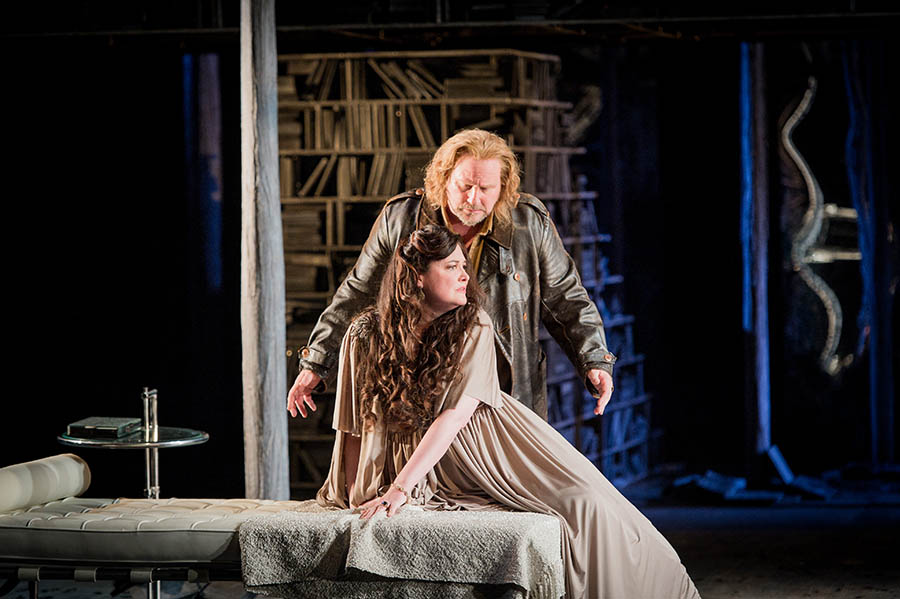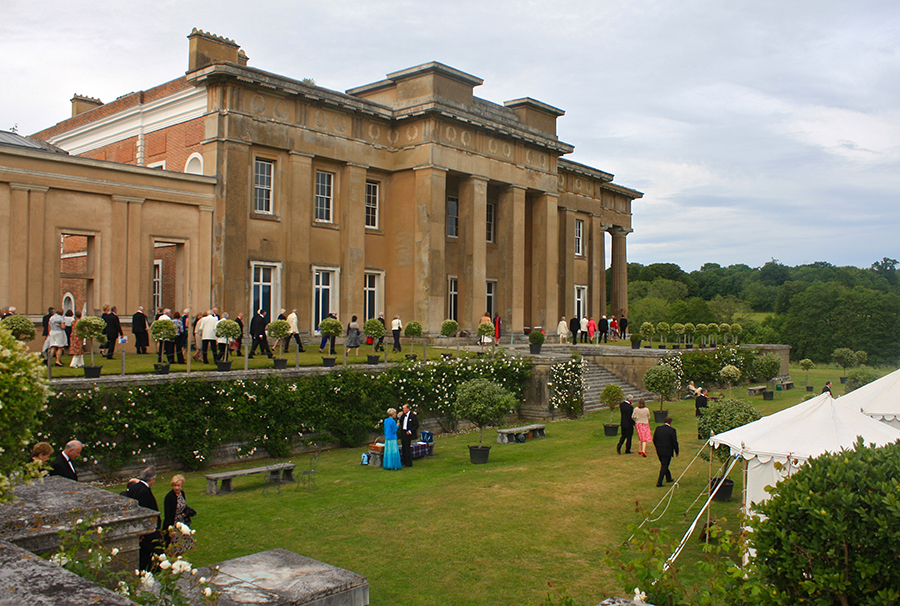SAMSON ET DALILA by CAMILLE SAINT-SAENS
Seen at Grange Park Opera June 24, 2015

The story, taken from the Book of Judges, about a classic haircut is well-known. We are all familiar with that sinking feeling and loss of potency after a horrific hair makeover. But in the face of defeat Samson, just like the composer Camille Saint-Saëns, found strength and ultimately victory. Come to think of it, Samson is one of history’s first suicide bombers and his self-destructive act appeared to have God’s blessing. What the Lord made of Saint-Saëns’s opera on the subject is not known, but its success lay for a long time in the balance.
Grange Park Opera’s new production of Samson et Delila contains some powerful singing and a very good orchestra to boot.
Why did Camille Saint-Saëns devote so much time to creating this work? Many of his most famous compositions seem effortlessness: the 4th and the 5th piano concertos, the Carnival of the Animals, the Danse Macabre and the Organ Symphony also show off his versatility.
Samson et Dalila started out as an oratorio and was performed at a number of private concerts. In the 19th century the use of a biblical subject for an opera was frowned upon in France, Great Britain and probably in most other European countries. After the humiliating Franco-Prussian War of 1870-71 Saint-Saëns for some reason decided that he had to rework the oratorio and ignore the censors and the self-appointed gatekeepers of the Christian faith.
But when Samson and Delilah was finally ready to be performed in 1877 nobody in France was willing to stage it. With the help of Franz Liszt it was therefore first seen in Weimar. Then it took 13 years before anyone in France showed interest and another 4 years before the country’s foremost company, Opéra de Paris, staged the work!
Certainly not an easy ride for an already very well respected pianist, organist and composer. In the end Saint-Saëns had reason to feel vindictive because the opera became a resounding success and in Paris alone it was performed 500 times during the next 30 years.

Samson et Dalila is now the only one of Saint-Saëns’s 12 operas that is performed on a fairly regular basis, but I had never before seen a production. I cherish my recording with Placido Domingo and Elena Obraztsova singing the title roles and Daniel Barenboim conducting. I made my mind up that I was not going to be unfair and expect the production at Grange Park Opera to musically reach those heights.
I needn’t have worried about the music, because all the musicians are equal to the task. But I want to take issue with the director of this production. Setting the opera in Vichy France during the German occupation doesn’t add anything to the action other than the most obvious. In the ballet scene it turns out that Delilah is a film star and instead of dancing we see the singers reacting to the action in the (oriental sounding) film that they are supposedly watching. I would still have preferred an orgiastic (bacchanale) ballet, but this solution is acceptable, because it is quite a sensible cost saving. But if the director wants to make a modern or even contemporary parallel why not portray the Philistines as Arabs, Palestinians (like Opera Flanders did) or ISIL. That last option could truly have been controversial and more relevant. I could do without swastikas and nazi saluting chorus members in opera production for a little while.
But the positives prevail over some poor directorial decisions. In the end the music comes first and overall the singers deliver the goods. Ex-bounty hunter Carl Tanner may not have the dashing looks but he has the CV to claim the part and certainly displays both the ‘helden’ tenor voice and the firm ease required in the love duet.
Sara Fulgoni sounds darkly seductive and at the same time possesses the regal air of the film star she is meant to be. She builds up the tension and expectations very well with long phrasing, before pulling out all the lyrical stops in the famous aria and subsequent duet ‘Mon coeur s’ouvre a ta voix’.
The youthful High Priest (Michel de Souza) is a man without a conscience and Christophoris Stamboglis as the Old Hebrew is as rock solid as the Masada fortress.
There are still clear elements of the original oratorio (Bach and Händel come to mind) in the first act and some of the rather static scenes can be blamed on the composer’s and the librettist Ferdinand Lemaire’s shortcomings. There are two choirs (Hebrews and Philistines) and the (mainly) young singers in the chorus get a marvellous opportunity to gain acting and singing experience.
Gianluca Marciano conducts the Bournemouth Symphony Orchestra with restraint but certainly doesn’t underplay the Wagnerian mellifluence and pomp. Grange Park Opera is very lucky to have such a fine orchestra as its house band.
END OF REVIEW

GRANGE PARK OPERA at NORTHINGTON, HAMPSHIRE
It is a perilous business running an opera company (even if it is only during the summer season) and perhaps even more so if you are dependent on incredibly generous, private donors. But Wasfi Kani clearly knows how to make the wealthy depart with their money for something as ephemeral as an opera performance. Grange Park Opera was founded in 1998 by Wasfi Kani and she remains the lynchpin. The location certainly plays a big part in the success of the whole operation
English Heritage’s property The Grange at Northington is surrounded by a landscaped garden and lush Hampshire countryside. An excellent setting for some heavy duty opera and a light picnic. The house has a Greek revival facade which could double as a backdrop for quite a few productions. The partly stripped and distressed Georgian interior are brought back to life every year when the bar and the restaurant are opened for the season.